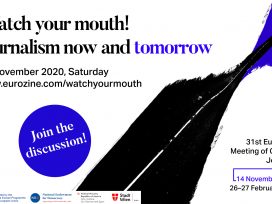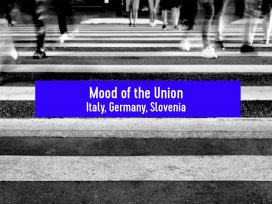Slovenia is living in trying times. Momentous sociopolitical events are happening one after another. Even before the debate over Slovenia’s co-financing of bankrupt Greece, which threatened to drag all of Europe down with it, had concluded, the informed public was upset by the planned government intervention in the pension system and regulation of employment. Union representatives had just begun preparing for the face-off of arguments over the survival of the welfare state when the battle over student employment started raging and stole all the media coverage. Then, just as the last granite cube, the only convincing argument of the student movement at the time, was cleared away from in front of the Slovenian Parliament, there appeared on the horizon the first slogans in support of and opposition to the arbitration agreement, as harbingers of the coming battle over a just border. On Sunday 6 June, the media, as dictated by the National Election Commission, announced the still unofficial results.
The episode involving Bozidar Novak, one of the leading lights from the Spem Communication Group, best attests to what trickled into the ears of Slovenian national television’s viewers in advance of that hallowed Sunday which produced the referendum results. This virtuous and overly self-confident man in one move devalued 19 years of effort by politicians and international lawyers on both sides of the border, representatives of the European Union, and in general all serious and well-informed people who had been dealing with this issue. He told the audience and host of the news program Odmevi (Repercussions) that together with his comrades – doubtless experts in public communication like himself – he had discovered during a morning brainstorming session that Slovenia had not yet exhausted all possibilities with respect to the referendum topic. That politicians had not invited into their ranks the best minds is generally known, but on the other hand they did not do quite so badly that in twenty years of effort they could not succeed in thinking up something better than what a group of PR agents dreamed up over morning coffee, prepping their boss for an evening television appearance. The solution that up until then had not occurred to anyone was an “all-Yugoslav conference on borders in the Balkans”. In short, this gentleman would resolve the problem of the border between two countries by adding to it the border problems of all the federal units of the defunct Yugoslavia. And this method of problem-solving, which is presented here as a bad joke, is a suitable parallel to the manner in which the government is going about trying to solve the financial crisis.
Meanwhile, as the best of Slovenia’s politicians and civil society were dealing with the issue of the border, some other people were forced to cross it heading south, from Slovenia through Croatia and towards Bosnia and Hercegovina. Shortchanged Bosnian workers, who build Slovenia’s houses, shopping centres and football stadiums, were forced by the letter of the law to leave Slovenia, their grievances unredressed. They left with empty pockets, denied several months’ wages for their hard labour. Against the scrum of political events all vying for the attention of television cameras, this was one issue related to the economic crisis that did not succeed in commanding the attention of prime time news programs. While the hosts of Odmevi each evening tackled a new tough nut presented by current politics, their journalist colleague Jelena Aschic filmed a segment for the investigative news program Dosje (Dossier), which introduced a new documentary genre: pre-Alpine horror story. If Bosnians in the 1980s wondered “Kuda idu Slovenci nedeljom” (“Where do Slovenians go on Sundays?”), this documentary answered the question of where Bosnians go on Sundays. To work! At least twelve and frequently even more hours. If by some chance they are not working, they are too exhausted and despondent to do anything more than lie motionless on their bunks in their quadruple bunk bed containers, for which each inmate pays an exorbitant monthly rent of 120 to 150 euros, in most instances paid directly to their employers. Marx gave this shrewd behaviour by capitalists an accurate name: secondary exploitation. Against this horrific fact Ivan Kroflich, the sales manager of Vegrad who generously offered his workers the use of a three-story house in Ljubljana is a true benefactor – although he did offer the house in exchange for money and crammed up to 65 overworked manual labourers into it. Any similarity to Engels’s nineteenth century work The Condition of the Working Class in England is of course entirely coincidental and malicious. Bosnian construction workers, who at one time described our pre-alpine land as a paradise, woke up after being transported to work in Slovenia in a nineteenth century nightmare dreamed up in broad daylight by twenty first century capitalist Slovenia.
The unions are keenly aware of this tragic repeat of early capitalism. The government is currently preparing or at least debating a multitude of laws with sweeping impacts on employment conditions. Their quantity alone is not a neutral fact. On the contrary, it attests to the current obsession with the field of labour legislation. The plethora of laws that the government has sent swarming over the foundations of the welfare state is of course considerably greater than what trade unionists can take in and process in such a short time. Of the twelve legislative proposals packaged under the title “secure flexibility and social cohesiveness”, two at most are deserving of the second part of the name. The remaining ten fall under the concept of secure flexibility. The open secret of this concept is that flexibility is the only novelty it brings, while the security which has already been achieved is being chipped away. Trade unions will have to give in due to the sheer quantity of the new proposals. Otherwise the political and media communities will accuse them of being – nineteenth century relics!
As bizarre as it may sound, the current government in this time of crisis is simply continuing the project begun by the previous government under the baton of young economists during a period of economic upturn. Young economists, as Slovenes kindly label radical neoliberals, from their first entry into the public arena, have never ceased to attack the trade union movement as superfluous. After the recent appearance of Joze P. Damjan in Odmevi, where he acknowledged the existence of the housing bubble which his economic policy under the previous government had helped to inflate, it became clear that opposition to trade unions is perhaps the only remaining unrefuted dogma of their neoliberal economic program. All other assumptions have already been overturned. Earlier, the government was pushed away from the free market, now all the young economists one after another preach about the urgency of returning to the market. The holy wrath directed against a union-organized working class remains as strong in an economic depression as in an economic upturn.
The official political economy of Slovenia does not differ significantly from Europe, which also abruptly applied the tenet that scaling back workers’ rights is no longer a matter of political choice but rather a consequence of the economic exigency imposed on the European Union by the case of Greece. But Greece has had a much greater impact on the welfare state and trade unions than on the politics of Europe. The well known economic analyst at the newspaper Delo, Dragisa Boskovic, wrote some time ago in his column that given the massive state injections of capital into the banking sector, it was only a matter of time before countries themselves became bankrupt. When banks and other financial institutions in crisis found themselves facing a liquidity crisis, they demanded financial support from their governments. And they got it. When these same financial institutions discovered that countries themselves are having problems with liquidity, they blithely forgot about the mutual solidarity pact and simply increased interest rates on government loans. As far as a naïve observer is concerned, the difference is that the first was a political demand which states could also have chosen not to meet, while the second is an economic fact which cannot be ignored. When an aide to the most powerful politician in the world, the president of the United States of America, observed what the financial markets had done to his country, he exclaimed, “in one of my future incarnations I would most like to come back as the bond market, since it is clearly more powerful than the American president.” Serge Halimi, writing about the case of France, clearly illustrates onto whom the granite logic of the political economy of modern states shifts the burden for solving financial problems: “Shareholders in Société Générale, reassured by a fresh European injection of ¤750bn into the furnace of speculation, saw the value of their assets rise by 23.89 per cent on 10 May – the same day that French president Nicolas Sarkozy announced that, due to budgetary constraints, a programme of aid that gave ¤150 to families in financial difficulty would be wound up.” In this paradoxical situation of the modern world there is no alternative but to cheer ourselves up with the simple Brechtian riddle: What is a granite cube in the hands of a student compared to an interest rate in the hands of a banker?






